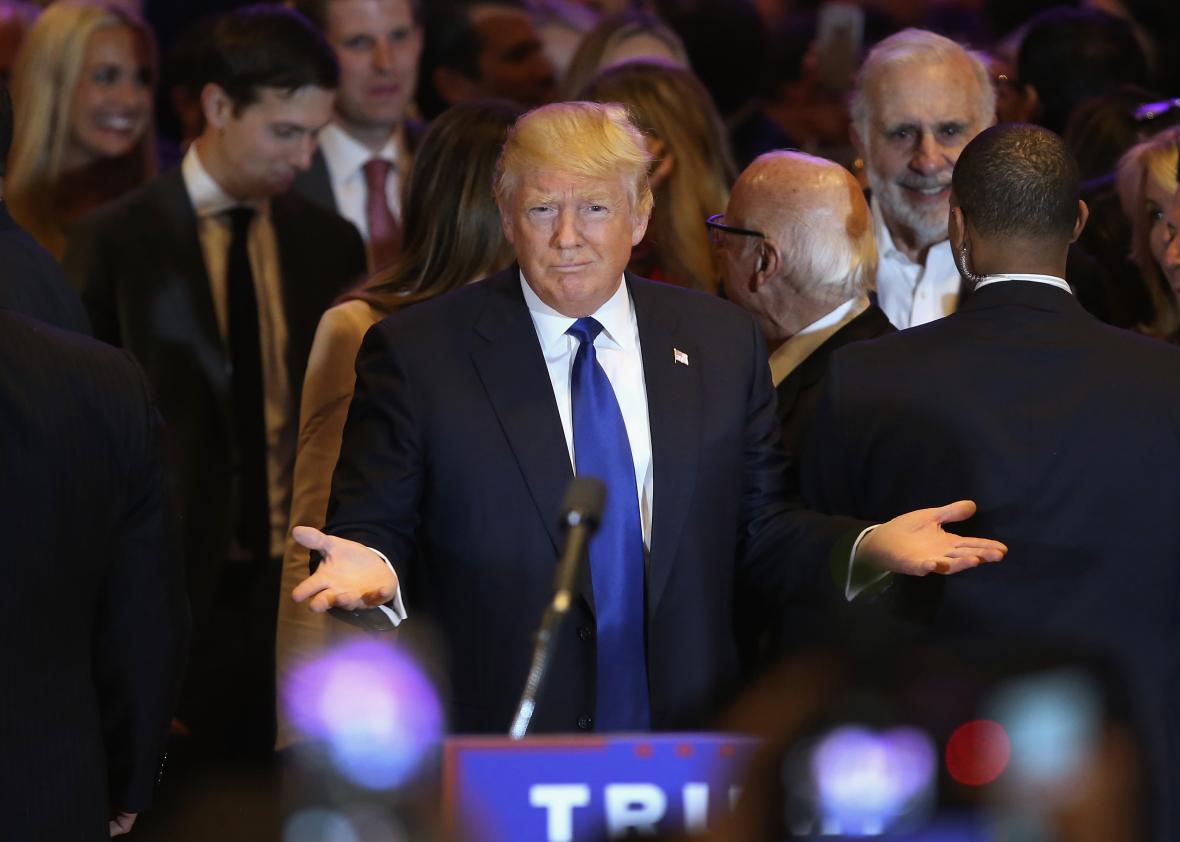When Donald Trump introduced his tax plan back in September, it felt like a delightfully half-assed trial balloon designed to test the proposition that Republican voters did not, in fact, care about traditional markers of political respectability (i.e. thoughtfully crafted policy platforms accompanied by dull white papers). It confirmed the hypothesis splendidly. Sure, the plan was fairly detailed by Trump’s standards. But it also mostly read like he’d just borrowed Jeb Bush’s carefully workshopped proposal, then cut its tax rates even further. The price tag was absurd—$10 trillion over a decade. It was a gonzo giveaway to the rich that would have imploded the federal budget. Debate moderators and his opponents pointed out how unrealistic the numbers were. It mattered not. Trump skated by, and even got some props from the likes of chief GOP anti-tax warrior Grover Norquist. Laughably unrealistic as it may have been, the document effectively communicated that Trump was a low-tax sort of guy, which was all anybody seemed to care about. It was like the man had shown up to class late for a final, copied off his classmate’s test, and gotten an A-/B+ before drinking a tall boy in the high school parking lot with his cheerleader girlfriend while high-fiving his buddies.
So it may seem a little odd that Trump has reportedly reached out to two of the Republican Party’s most notorious economic hacks to rewrite his tax plan, even though it already seems to have served its purpose. According to Politico, the presumptive GOP nominee has asked Stephen Moore, the Heritage Foundation’s factually challenged former chief economist, and CNBC talking head Larry Kudlow for suggestions about how to make his proposal less expensive. Given the utterly insignificant role policy specifics have played during the Republican contest, one can’t help but ask: Why bother now? Trump’s GOP opponents are vanquished. Turning his budget-busting, arch-conservative tax agenda into a slightly less budget-busting arch-conservative tax agenda probably isn’t going to inoculate him from Hillary Clinton’s criticisms. What’s the deal?
One possibility is that Trump is still worried about consolidating support from the Republican donor class, which he now needs in order to fund his general election campaign, and that this is his olive branch. Moore and Kudlow, a Reagan White House vet who was fired from his job as chief economist at Bear Stearns, are exuberant, rigidly ideological supply-siders, as well as card-carrying members of the Republican establishment. By working with them, Trump can signal that he shares the Republican elite’s most cherished values, which is to say, a belief in cutting their taxes. It should certainly put to bed any notion that Trump might be interested in raising taxes on the rich—a notion that he seemed to hint at over the weekend before quickly walking it back on CNN.
Moore and Kudlow can also give the plan a veneer of conservative intellectual respectability—which probably isn’t that important, except insofar as it might demonstrate that Trump himself is aware that such a thing exists. According to Politico, they’re looking to bring the proposal’s total cost closer to $3.8 trillion, which would still be mammoth. One of their money-saving ideas is cutting the top marginal rate to 28 percent instead of 25 percent, as Trump originally intended. (It’s currently 39.6.) At the same time, they also want him to lower capital gains rates and give corporations the ability to immediately expense investments, both of which are high priorities for business-minded conservatives. That should help it get positive reviews from the Tax Foundation, the conservative movement’s tax think tank of choice, which is scoring the plan’s economic and budget effects. From what I’ve been told by people who’ve actually seen detailed presentations about the foundation’s tax model—I’ve asked for a guided overview, but haven’t had any luck—it basically assumes that business and investment tax cuts are extremely pro-growth, which means they lose less revenue than other cuts.
With all that said, I do wonder what this all says about Trump’s general election strategy. His campaign has said outright that it wants to woo Bernie Sanders’ supporters. But as you might be aware, the senator from Vermont is less than keen on tax cuts for the rich. Does Trump think this is just a minor issue for the Sanders’ fans constituency? Does he think his symbolic outsiderness and protectionist rhetoric will be enough to win them over from Clinton, no matter how plutocrat-friendly his tax policy might be? Or is he simply lurching from position to position without much forethought or strategy? You be the judge.
